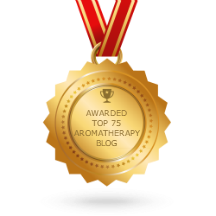"Marge - you and I have briefly chatted about the idea that finding an essential oil to smell pleasant can add to its therapeutic action. Can you share some additional info or thoughts on this topic? I'm interested in anything you want to share! "
In my experience, this holds true in so many different scenarios...

First of course, is patient compliance. Example: Valerian oil is supposed to help with sleep problems. I can suffer from extended insomnia. It should be the perfect oil for me. STINKY STUFF... Stinks up my bedroom. NEVER... I would have to go sleep on the couch! Now, seriously, is an oil I can't STAND the smell of going to help me relax into a peaceful night's sleep? Not quite. Now, this is for a more "mental/emotional" effect than physical, I think. But, if you loathe the aroma, or the skin feel of a .. pain relieving balm, let's say. Are you going to apply it frequently and keep ahead of the pain, or are you going to wait until the pain gets REALLY bad before applying? You are going to delay. And perhaps not apply at times that you should because "I'm not going out in public smelling like THAT!" So, compliance can be a major issue.
Emotional uses are so often tied to their physical manifestations. Last week we talked about Ylangylang oil lowering blood pressure. Now, this is both an emotional (I think!) and demonstrably physical reaction. But if the patient is among the group that dislikes Ylangylang, or finds that it triggers headaches, will it lower their BP or will it be more apt to increase it?
Placebo effect? This is very very real I have created blends for people who think what I do is all placebo, all smoke and mirrors. My blends do NOT work for them... pain relieving blends that have helped hundreds. "Couldn't tell a difference," they said. This is a case of placebo working against us. They are convinced that it can't help, and, because they won't ALLOW it to help, it doesn't. If someone enjoys the smell of something AND believes it will help the physical condition that is being treated, from my experience, I think it will be more effective.
"When in doubt, treat for stress." This is a mantra of my CCAP teacher. If we don't know what is going on, in adults, in today's society, there is almost ALWAYS a stress component, no matter what the chronic condition presents as. (I'm not talking about a broken ankle, here, although you need to deal with the stress of that, too!)
If you can address the stress,
with a pleasant smelling aromatic intervention,
you are going to make a difference.
This is one of the most profoundly powerful
and empowering interventions
we can provide, whether as professional clinicians
or impassioned and knowledgeable amateurs.
Hope this helps!
Marnie, another participant commented, "Well it helped me! I was just going to ask a similar question. I finally made the blend with your back ease and added plai. I don't think my mother would really dig that scent so I added geranium. Which I don't care for but she loves. So thanks for this answer!"
"And if she loves it... and it doesn't work AGAINST the goal... good! Geranium has been shown to help with one type of neuropathy, post shingles, I think, but am not sure, so adding to a pain blend may help!"
I think the point here is that there are almost always oils that you can substitute, based on your desired goal. So you choose oils that are pleasing to the person you are blending for. And if "this" oil is a "yuck", then you explore functional alternatives until you find a "yum!" And, if need be, if you can't replace the primary oil, then add some that will support some of the goals of treatment, and that will make the aroma pleasanter for ... whoever!
Hope this helps!
Marnie, another participant commented, "Well it helped me! I was just going to ask a similar question. I finally made the blend with your back ease and added plai. I don't think my mother would really dig that scent so I added geranium. Which I don't care for but she loves. So thanks for this answer!"
"And if she loves it... and it doesn't work AGAINST the goal... good! Geranium has been shown to help with one type of neuropathy, post shingles, I think, but am not sure, so adding to a pain blend may help!"
I think the point here is that there are almost always oils that you can substitute, based on your desired goal. So you choose oils that are pleasing to the person you are blending for. And if "this" oil is a "yuck", then you explore functional alternatives until you find a "yum!" And, if need be, if you can't replace the primary oil, then add some that will support some of the goals of treatment, and that will make the aroma pleasanter for ... whoever!





No comments:
Post a Comment